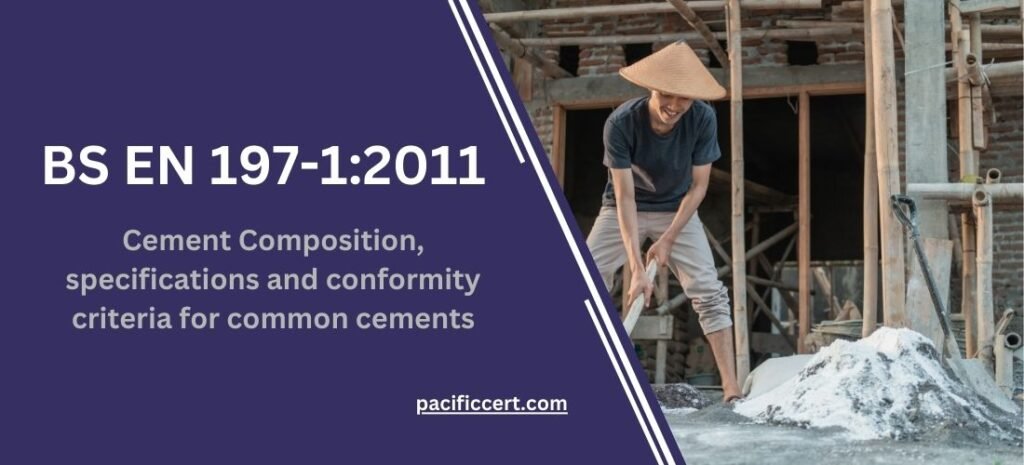
What is BS EN 197-1:2011-Cement Composition, specifications and conformity criteria for common cements?
BS EN 197-1:2011 is a British and European standard that sets out the requirements for the composition, specifications, and conformity criteria for common cements used in construction. The standard covers the following aspects of cement:
Composition
Physical and mechanical properties
Conformity criteria
Marking and labeling
BS EN 197-1:2011 helps to ensure that cement products used in construction meet the required standards of quality and safety, and that they are consistent and reliable. The standard provides a common framework for the production, testing, and use of cement products, which helps to promote quality assurance, safety, and efficiency in the construction industry.
Requirements of BS EN 197-1:2011
Chemical and mineralogical composition: The standard specifies the minimum and maximum limits for the chemical and mineralogical composition of different types of cement. This includes the content of major and minor components. Such as calcium oxide, silica, alumina, iron oxide, magnesium oxide, and sulfur trioxide.
Physical and mechanical properties: This standard sets out the requirements for the physical and mechanical properties of cement. Including compressive strength, setting time, soundness, and fineness. The requirements vary depending on the type and strength class of cement.
Conformity criteria: The standard specifies the methods and criteria for testing and evaluating cement products to ensure that they meet the required specifications and standards of quality. This includes requirements for sampling, testing, and evaluation of conformity.
Marking and labeling: The standard requires that all cement products be marked or labeled to indicate the type of cement, its strength class, and any other relevant information.
Finally, Packaging and storage: This standard specifies the requirements for the packaging and storage of cement products. Including requirements for labeling, stacking, and protection from moisture and other environmental factors.
Compliance with BS EN 197-1 helps to ensure that cement products used in construction meet the required standards of quality and safety.
Therefore, The standard provides a framework for the production, testing, and use of cement products. Which helps to promote quality assurance, safety, and efficiency in the construction industry.
Benefits of BS EN 197-1:2011
Improved quality and consistency of cement: The standard sets out the requirements for the chemical and mineralogical composition, physical and mechanical properties, and conformity criteria for cement. So, Compliance with these requirements helps to ensure that cement products meet the required standards of quality and consistency, which is essential for the safety and durability of buildings and structures.
Increased safety: Compliance with the standard helps to ensure that cement products used in construction are safe and reliable. This is particularly important in applications where cement is used in critical structural elements. Such as bridges, dams, and high-rise buildings.
Simplified procurement: This standard provides a common framework for the production, testing, and use of cement products, which helps to simplify the procurement process. In fact, This allows construction professionals to more easily identify and specify the appropriate type and strength class of cement for their projects.
International recognition: BS EN 197-1:2011 is a European standard, which means that compliance with the standard is recognized across the European Union. This helps to facilitate the international trade of cement products, as well as the harmonization of standards across different countries and regions.
Improved sustainability: The standard includes requirements for the use of alternative raw materials and the reduction of greenhouse gas emissions during the production of cement. So, Compliance with these requirements helps to promote sustainable practices in the cement industry, which is essential for the long-term viability of the construction sector.
Who needs BS EN 197-1:2011-Cement Composition, specifications and conformity criteria for common cements ?
Cement manufacturers: The standard provides guidance on the composition, specifications, and conformity criteria for different types of cement, which helps manufacturers to produce cement products that meet the required standards of quality and safety.
Construction professionals: Architects, engineers, and contractors need to specify the appropriate type and strength class of cement for their projects based on the intended use and design requirements. So, Compliance with the requirements of the standard helps to ensure that the cement products used in construction are safe, reliable, and of consistent quality.
Regulatory authorities: Government agencies and regulatory bodies responsible for overseeing the construction sector use the standard as a reference for setting standards and regulations related to the production, testing, and use of cement in construction.
Also, Testing and certification bodies: The standard provides the testing and conformity criteria for cement products, which helps testing and certification bodies to evaluate the quality and safety of cement products and issue the appropriate certifications.
Therefore, BS EN 197-1:2011 is relevant for all stakeholders involved in the production, testing, specification, procurement, and use of cement in construction. As it provides a common framework for ensuring the quality, safety, and sustainability of cement products.
Pacific Certifications is accredited by ABIS, if you need more support with EN 197-1, please contact us at +91-8595603096 or support@pacificcert.com
Read About: EN 196-1:2016









